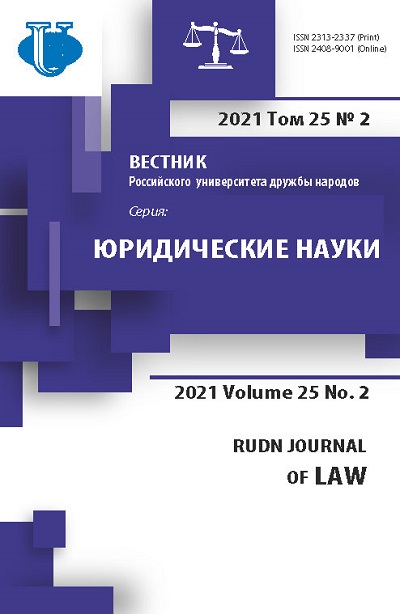Constitutional silence on election postponement in Ethiopia amidst a pandemic: A critique of constitutional interpretation
- Authors: Salemot M.A.1
-
Affiliations:
- Lecturer of Federalism at Debark University
- Issue: Vol 25, No 2 (2021)
- Pages: 714-731
- Section: INTERNATIONAL LAW. FOREIGN LAW
- URL: https://journals.rudn.ru/law/article/view/26722
- DOI: https://doi.org/10.22363/2313-2337-2021-25-2-714-731
- ID: 26722
Cite item
Full Text
Abstract
Election postponement in Ethiopia, due to the COVID-19 pandemic, has raised critical constitutional questions that have never been really thought before in the country’s constitutional law jurisprudence. This is because the state of emergency measure in Ethiopia, due to the spread of COVID-19, is in conflict with constitutional deadlines for elections. The constitutional lacuna is complicated by the absence of explicit constitutional provisions that indisputably govern election postponement. Although any legal measures to postpone election schedule and pass constitutional deadlock is far from simple, the Ethiopian government has suggested four possible ‘options’ to the constitutional dilemma: dissolving the parliament, declaring state of emergency, amendment of the Constitution and constitutional interpretation. Finally, the House of Federation (HoF), the Ethiopian upper House entrusted to interpret the constitution decided and postponed the election indefinitely until the pandemic no longer poses a risk to public health confirmed by the parliament which has direct vested interest in the outcome. This research investigates whether the constitutional interpretation option adheres to the premises of the Ethiopian Constitution or is it extra constitutional. Accordingly, the HoF provided superficial analysis and fallacious reasoning and failed to meaningfully grapple with the serious constitutional issues. The constitutional interpretation is not constitutionally bound and is defective. The manner the HoF managed the constitutional vacuum concerning election postponement, indisputably, was ‘constitutional interpretation’ by name but a political decision in practice.
About the authors
Marew Abebe Salemot
Lecturer of Federalism at Debark University
Author for correspondence.
Email: marewobu@gmail.com
ORCID iD: 0000-0003-2612-6923
Lecturer of Federalism
90 Debark, Gonder, EthiopiaReferences
- Anthony, B. (2020) Elections and COVID-19: Legal Consideration as a way out. International Foundation for Electoral Systems. 1-10
- Antonio, S. (2020) Managing Elections Under The COVID-19 Pandemic: The Republic of Korea’s Crucial Test, International Institute for Democracy and Electoral Assistance (IDEA), Technical Paper, 1-8. doi: 10.31752/Idea.15
- Binder, K. et al. (2020) States of Emergency in Response to the Coronavirus Crisis: Situation in Certain Member States, EPRS. Available at: https://www.europarl.europa.eu/RegData/ etudes/BRIE/2020/649408/EPRS_BRI(2020)649408_EN.pdf [Accessed 23rd August 2020]
- Choudhry, S. (2017) Transnational Constitutionalism and a Limited Doctrine of Unconstitutional Constitutional Amendment. International Journal of Constitutional Law. 15 (3), 23-34
- Davide, E. (2019) From an Unconstitutional Constitutional Amendment to an Unconstitutional Constitution? Lessons from Honduras. Global Constitutionalism. Cambridge University Press. 8 (1), pp. 40-70
- Guyora, B. & Brenner, M. (2019) Fissell. A Political Interpretation of Vagueness Doctrine. UNIV. OF ILL. L. REV. 1527, pp. 1-63. Available at: https://scholarlycommons.law.hofstra.edu/ faculty_scholarship/1254 [Accessed 21st August 2020]
- Katherine, E. (2020) The Legal Quagmire of Postponing or Modifying Election. International Foundation for Electoral Systems. Available at: https://www.ifes.org/news/Legal-Quagmire-Postponing-Or-Modifying-Elections [Accessed 23rd August 2020]
- Katherine, E. (2020) Legal Considerations When Delaying or Adapting Elections. International Foundation for Electoral Systems. Available at: https://www.ifes.org/sites/default/files/ ifes_covid-19_briefing_series_legal_considerations_when_delaying_or_adapting_elections_ june_2020.pdf [Accessed 23rd August 2020]
- Malah, A. (2009) Constitutional Protection in Cameron: Critique of the Amendment Mechanism. MA Thesis, Central European University
- Randall, K. (1994) Styles of Constitutional Interpretation and the Four Main Approaches to Constitutional Interpretation in American Legal History. 29 Val. U. L. Rev. (121), 121-233
- Sead, A. & Matatu, N. (2019) Timing and Sequencing of Transitional Elections. International IDEA Policy Paper. (18), 1-61. doi: 10.31752/idea.2019.13
- Solomon, A. (2020) Constitutional Based National Dialogue the Best Way to Avert a Constitutional Crisis Triggered by Deferred Election. Addis Standard, Op-Eds
- Solomon, A. et al. (2020) Joint Submission to the Constitutional Council of Inquiry of the Federal Democratic Republic of Ethiopia on the Matter of the House of Peoples’ Representative Request for Constitutional Interpretation, CCI. Available at: http://Addisstandard.Com/ Op-Ed-Constitutional-Based-National-Dialogue-The-Best-Way-To-Avert-A-ConstitutionalCrisis-Triggered-By-Differed-Election/ [Accessed 23rd August 2020]
Supplementary files















